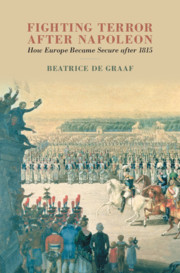Book contents
- Fighting Terror after Napoleon
- Fighting Terror after Napoleon
- Copyright page
- Contents
- Figures
- Maps
- Tables
- Acknowledgements
- Prologue
- 1 Introduction
- 2 Providence in Paris
- 3 Balancing in a Climate of Distress
- 4 ‘A Moderate Occupation’
- 5 Fausses nouvelles and ‘Blacklists’
- 6 Fighting terroristes Together
- 7 The Price of Security
- 8 Fortress Europe
- 9 Beyond Europe
- 10 Conclusion
- Bibliography
- Index
1 - Introduction
Napoleon’s Frustration
Published online by Cambridge University Press: 12 September 2020
- Fighting Terror after Napoleon
- Fighting Terror after Napoleon
- Copyright page
- Contents
- Figures
- Maps
- Tables
- Acknowledgements
- Prologue
- 1 Introduction
- 2 Providence in Paris
- 3 Balancing in a Climate of Distress
- 4 ‘A Moderate Occupation’
- 5 Fausses nouvelles and ‘Blacklists’
- 6 Fighting terroristes Together
- 7 The Price of Security
- 8 Fortress Europe
- 9 Beyond Europe
- 10 Conclusion
- Bibliography
- Index
Summary
After Napoleon was defeated by the Allies in 1815, a new European security culture emerged out of the remnants of war. The Allied occupation of France and a number of ambassadorial conferences brought forward a collective security system, implemented by the Allied Council and aimed at fighting terror in peacetime. The four great powers of Europe – the United Kingdom, Prussia, Austria and Russia – institutionalized and standardized a new form of security management during peace negotiations at the Congress of Vienna and the Paris Conference, exemplified by the efforts of the ministers of the four great powers to debate, transform and implement their security practices across Europe. In the fight against terror, state interest, new fortifications, police reforms and military strategies went hand in hand with diplomacy and international relations on a scale never seen before. This chapter describes how the history of the tumultuous time of post-Napoleonic peace is reconstructed in this book, considering not only the institutional history, but also the emotional aspects, as voiced by the main protagonists as they tackled the subject of terror and security in Europe and beyond.
Keywords
- Type
- Chapter
- Information
- Fighting Terror after NapoleonHow Europe Became Secure after 1815, pp. 8 - 37Publisher: Cambridge University PressPrint publication year: 2020

